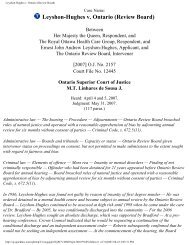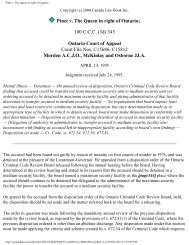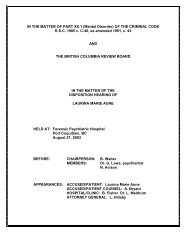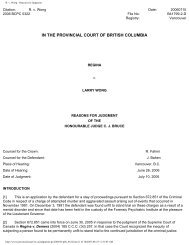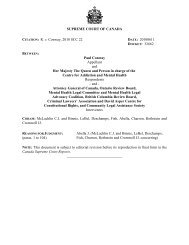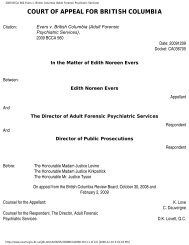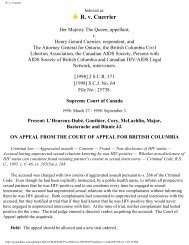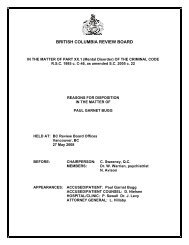LaFortune [LaFortunate] (Re) - British Columbia Review Board
LaFortune [LaFortunate] (Re) - British Columbia Review Board
LaFortune [LaFortunate] (Re) - British Columbia Review Board
Create successful ePaper yourself
Turn your PDF publications into a flip-book with our unique Google optimized e-Paper software.
<strong>LaFortune</strong> [<strong>LaFortunate</strong>] (<strong>Re</strong>) 2 This case applies the "capacity" test for determining fitness to stand trial, and considers whatdegree of impairment arising from mental retardation would render an accused unfit.3. <strong>Re</strong>asoning 3 After noting that the accused must fit within the statutory definition set out in the Criminal Codeto be considered unfit to stand trial, the panel applied the "limited cognitive capacity" test. As stated bythis panel, this is a twofold test: (1) is the excused able, after being furnished with an explanation, tounderstand the nature, object and possible consequences of the proceedings, and (2) is the accused able(although perhaps unwilling) to communicate with counsel. The panel noted that this test was set out inR. v. Taylor (1992), 1992 72 C.C.C. (3d) 551 (BCCA), and quoted with approval a statement of thecourt warning against setting too high a standard for determining fitness to stand trial. 4 In this case, the accused had a general idea of the nature and object of the proceedings, such asknowing she could go to jail or be placed on probation. As well, the accused was able to identify theparticipants in a trial (such as the judge and her lawyers), although she was less clear on their functions.This understanding was sufficient to meet the fitness standard. 5 Furthermore, even if the accused did not currently have the necessary knowledge, the panelbelieved that if properly coached, the accused would be able to understand the functions of the court.The panel came to this conclusion based on the accused's I.Q., and the ability of the accused to answersome of the questions of the panel. The panel noted that as the accused had never been to school, and didnot read much, she may not have had the occasion to learn how the court functions. 6 Turning to the second part of the test, the panel noted that the accused was able to communicatewith counsel. Although communicating with the accused could be frustrating, and the accused wouldsometimes refuse to talk to counsel, the panel noted that counsel does not have to be satisfied with thedegree of communications for the accused to be found fit. The accused was able, after some initialdifficulties, to recall some of the circumstances surrounding each of the offences. Given that this was arelatively straightforward case, with independent witnesses, the panel found that this degree ofrecollection enabled the accused to participate in the proceedings. As well, the inability of the accused torecall enough of the index offences to help her counsel in preparing the defence, although relevant,would not of itself render the accused unfit. Such a finding would mean that otherwise competentindividuals would be found unfit, and would always be subject to the jurisdiction of the <strong>Re</strong>view <strong>Board</strong>.BackgroundREASONS FOR DECISION ON FITNESS TO STAND TRIAL 7 The three alleged offences with which Corinne Cheryl <strong>LaFortune</strong> ("the accused") is charged areall assaults contrary to s. 266 of the Criminal Code, which occurred April 18, 1997 at or near Saanich,and August 31 and September 2, 1997 at or near Victoria. The complainants in the first two cases werehttp://ql.quicklaw.com/qltemp/C2KEwCMAFbZMTYcs/00049bcrb-00000604%2ehtm (2 of 16)2007-08-21 1:59:51 PM


![LaFortune [LaFortunate] (Re) - British Columbia Review Board](https://img.yumpu.com/42779845/2/500x640/lafortune-lafortunate-re-british-columbia-review-board.jpg)
